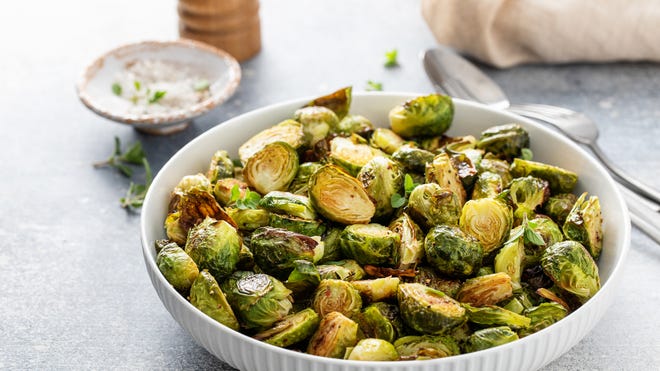If you were served boiled Brussels sprouts a kid, there’s a good chance you don’t have fond memories of the experience. But when cooked correctly, the vegetable both tastes good and offers a variety of health benefits.
“Fall produce brings in nutrient-packed options like pumpkin, squash, apples and Brussels sprouts, all of which are at their peak in flavor and nutrition,” Washington, D.C.-based dietitian Caroline Thomason, RD, CDCES, tells USA TODAY. “Think of it as nature’s way of giving us the best fuel for the colder months ahead. Seasonal produce tends to be fresher, more affordable and full of flavor because it’s harvested at its natural peak. Plus, the variety in fall produce makes it easy to fill your plate with color, which means a wider range of nutrients. It’s a delicious, nutritious way to celebrate the season.”
Here’s what nutrition experts want you to know before adding Brussels sprouts to your fall menus.
Are Brussels sprouts good for you?
Brussels sprouts fall under the category of cruciferous vegetables, which also includes kale, broccoli, cauliflower, collard greens and cabbage, according to the Harvard T.H. Chan School of Public Health. Cruciferous vegetables contain a phytochemical called glucosinolate that, when cooked and digested, turns into compounds called isothiocyanates, which has been linked to “anti-inflammatory benefits and cancer prevention,” Thomason notes.
She dubs Brussels sprouts “mini-cabbages packed with goodness,” because they’re “rich in vitamins C and K, antioxidants and fiber, making them great for immune support and heart health.”
Convert veggie haterswith this Brussels sprouts and maple syrup recipe
Is it OK to eat Brussels sprouts every day?
While Brussels sprouts offer plenty of health benefits, there can be too much of a good thing.
“One downside for some people is that Brussels sprouts may cause gas or bloating, especially if you’re not used to eating a lot of fiber,” Thomason says.
The perfect pairing:Make these easy lemon Brussels sprouts
To counter this, she recommends roasting or air frying the sprouts, rather than eating them raw. Cooking them this way, rather than boiling, also enhances their natural sweetness as opposed to boiling, which can intensify a bitter and sulfuric taste.
